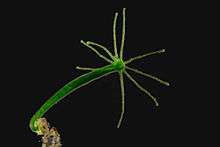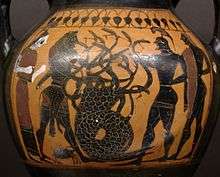Definify.com
Webster 1913 Edition
Hydra
Hy′dra
,Noun.
pl. E.
Hydras
(#)
, L. Hydræ
(#)
. 1.
(Class. Myth.)
A serpent or monster in the lake or marsh of Lerna, in the Peloponnesus, represented as having many heads, one of which, when cut off, was immediately succeeded by two others, unless the wound was cauterized. It was slain by Hercules. Hence, a terrible monster.
Gorgons, and
Hydras
, and Chimeras dire. Milton.
2.
Hence: A multifarious evil, or an evil having many sources; not to be overcome by a single effort.
3.
(Zool.)
Any small fresh-water hydroid of the genus
Hydra
, usually found attached to sticks, stones, etc., by a basal sucker. ☞ The body is a simple tube, having a mouth at one extremity, surrounded by a circle of tentacles with which it captures its prey. Young hydras bud out from the sides of the older ones, but soon become detached and are then like their parent. Hydras are remarkable for their power of repairing injuries; for if the body be divided in pieces, each piece will grow into a complete hydra, to which fact the name alludes. The zooids or hydranths of marine hydroids are sometimes called hydras.
4.
(Astron.)
A southern constellation of great length lying southerly from Cancer, Leo, and Virgo.
Webster 1828 Edition
Hydra
HY'DRA
,Noun.
1.
A water serpent. In fabulous history, a serpent or monster in the lake or marsh of Lerna, in Peloponnesus, represented as having many heads, one of which, being cut off, was immediately succeeded by another, unless the wound was cauterized. Hercules killed this monster by applying firebrands to the wounds, as he cut off the heads. Hence we give the name to a multitude of evils, or to a cause of multifarious evils.2.
A technical name of a genus of Zoophytes, called polypus, or polypuses.3.
A southern constellation, containing 60 stars.Definition 2026
Hydra
Hydra
Translingual

Hydra
Etymology
From Latin Hydra, the mythical serpent.
Proper noun
Hydra f
- A taxonomic genus within the family Hydridae – predatory freshwater cnidarians, thought not to age, the hydras.
Hypernyms
- (genus): Animalia - kingdom; Cnidaria - phylum; Medusozoa - clade; Hydrozoa - class; Hydroida - order; Hydrida - suborder; Hydridae - family
Hyponyms
English

A Greek vase depicting the Lernaean Hydra
Proper noun
Hydra
- (Greek mythology) A mythological serpent with seven heads, slain by Hercules as one of his twelve labours. Also called the Lernaean Hydra.
- (astronomy) A spring constellation of the northern sky, said to resemble a serpent. It lies just south of the zodiac and contains the star Alphard.
- (astronomy) The name of one of Pluto's moons. (Named 21 June 2006).
Synonyms
- (astronomy, moon of Pluto): Pluto II, S/2005 P 1, S/2005 P 1 (Hydra), (134340) Pluto II, (134340) Pluto II Hydra, Pluto II (Hydra)
Derived terms
Translations
mythical serpent
|
constellation
one of Pluto's moons
|
|
See also
Anagrams
Latin
Etymology
From Ancient Greek ὕδρα (húdra).
Proper noun
Hydra f (genitive Hydrae); first declension
References
- Hydra in Charlton T. Lewis and Charles Short (1879) A Latin Dictionary, Oxford: Clarendon Press
- Félix Gaffiot (1934), “Hydra”, in Dictionnaire Illustré Latin-Français, Paris: Hachette.
Polish
Pronunciation
- IPA(key): /ˈxɨdra/
Proper noun
Hydra f
Declension
declension of Hydra
| singular | |
|---|---|
| nominative | Hydra |
| genitive | Hydry |
| dative | Hydrze |
| accusative | Hydrę |
| instrumental | Hydrą |
| locative | Hydrze |
| vocative | Hydro |
hydra
hydra
English

Hydra
Noun
hydra (plural hydras or hydrae or hydræ)
- Any of several small freshwater polyps of the genus Hydra and related genera, having a naked cylindrical body and an oral opening surrounded by tentacles.
- A complex, multifarious problem or situation that cannot be solved easily and rapidly.
- 2009, Kris Frieswick, Till Death Do Us Pay:
- Because the statute is so vaguely worded, award decisions are habitually based on case law, the growing mountain of which is a hydra of rulings that point in so many directions that almost any decision can be defended or overturned on appeal, depending on how smart your lawyer is and which precedent he selects to argue your case.
- 2009, Kris Frieswick, Till Death Do Us Pay:
Translations
complex, multifarious problem
|
|
Anagrams
Latin
Etymology
From Ancient Greek ὕδρα (húdra).
Pronunciation
- (Classical) IPA(key): /ˈhʏ.dra/
Noun
hydra f (genitive hydrae); first declension (masculine hydrus)
- A water-snake.
Inflection
First declension.
| Case | Singular | Plural |
|---|---|---|
| nominative | hydra | hydrae |
| genitive | hydrae | hydrārum |
| dative | hydrae | hydrīs |
| accusative | hydram | hydrās |
| ablative | hydrā | hydrīs |
| vocative | hydra | hydrae |
Related terms
References
- hydra in Charlton T. Lewis (1891) An Elementary Latin Dictionary, New York: Harper & Brothers
- HYDRA in Charles du Fresne du Cange’s Glossarium Mediæ et Infimæ Latinitatis (augmented edition, 1883–1887)
- hydra in The Perseus Project (1999) Perseus Encyclopedia
- hydra in Harry Thurston Peck, editor (1898) Harper's Dictionary of Classical Antiquities, New York: Harper & Brothers
- hydra in William Smith., editor (1854, 1857) A Dictionary of Greek and Roman Geography, volume 1 & 2, London: Walton and Maberly